The West Midlands, with Birmingham at its centre, was once hailed as the UK’s engineering and manufacturing heart with many goods produced within its factories, plants, mines and mills.
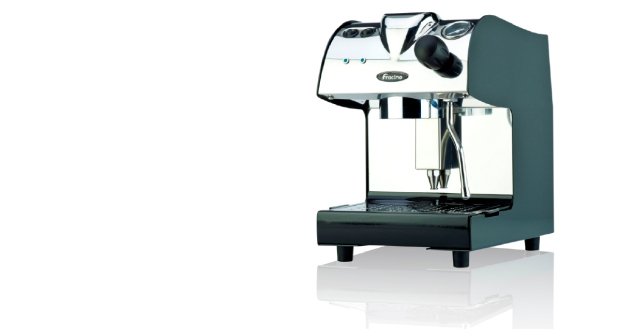
Although there were a number of bottlenecks in the development process of the Piccino it was successfully launched earlier this year and will imminently go into production at Fracino’s factory in Birmingham
Today, it’s a shadow of its former ‘industrial’ self with many businesses having disappeared altogether or still in operation but manufacturing abroad. So it’s heartening to find a Birmingham-based manufacturer that is still thriving despite the UK recession and global economic climate.
Lying inconspicuously within an industrial unit in the Wryley Trading Estate just off the M6 is Fracino – the UK’s only manufacturer of cappuccino and espresso machines. “We are very lucky because we have been almost inflation and recession proof. In fact, we have had a 20% increase in turnover for the second successive year,” says Adrian Maxwell, Fracino’s managing director.
We want it made here in Birmingham because we want it to be a true British product. The quality of British manufacturing is definitely 100% and price wise it’s very competitive now Adrian Maxwell, managing director of Fracino
Adrian Maxwell’s father, Frank, started the business in 1964 and initially ran it out of his garden shed. Today this 27-strong company boasts a portfolio of 60 products and sells over 2,000 coffee machines annually.
Over the years its distributor base has expanded to 700 and, in fact, the falling value of the pound has allowed it to expand export sales to many new markets. “We have grown our distributor network probably by 25% and we also then deliberately looked for the export market because the pound was weak.
That paid dividends as well,” explains Maxwell. Korea, Turkey and Lithuania are among the latest countries to import the Fracino range and, according to Maxwell, China is a big growth market. But what about Italy, arguably the home of coffee? What do they make of this British product? Maxwell smiles and says that the Italians like it and as ‘Fracino’ has an Italian ring to it some even think it’s an Italian brand. This is amusing when you discover that the word Fracino is actually derived from putting the words ‘Frank’ and ‘cappuccino’ together!
Starting out
Frank Maxwell originally started out selling and servicing coffee machines but once Adrian joined the business almost 25 years ago they soon started to make their own.
“In the early days my dad just imported then sold and serviced espresso machines. But then that crunch period at the beginning of the 90’s happened and the Spanish factory we were importing from in large quantities sold out to an American firm, which subsequently ran into financial trouble. We just couldn’t get the product, it was an absolutely dead situation,” remembers Maxwell. “We could go to another manufacturer but I was sick to death of dealing with the Italians and Spanish because nothing was straight forward. We needed to control our own destiny and as we are engineers, we thought why don’t we make our own? That was really the start.”
Although the business didn’t immediately have all the money available for tooling they bought a factory in Birmingham and began on a small scale subcontracting a lot of the work out but assembling it in-house. “Then, of course, as the business grew we reinvested and bought our own tools so that we could make more of the parts and components in-house,” says Maxwell. In 2005 the business invested in a bigger industrial unit and in 2009 bought a CNC tube bender.
Maxwell is passionate about maintaining Fracino’s manufacturing base in the UK and as far as possible uses local suppliers. “We want it made here in Birmingham because we want it to be a true British product.
The quality of British manufacturing is definitely 100% and price wise it’s very competitive now. You can manufacture cheaper than you can anywhere else in Europe that is for sure. That isn’t factoring in shipping costs – just raw cost,” he claims.
Another reason why Maxwell wants to manufacture on-site and use local suppliers is that he feels more in control of the process. “For instance,” he explains, “if there is a problem it takes me 10 minutes to drive to the supplier and sort it out. Job done. But if it’s a problem that comes from Italy I then have to ship a whole pallet load of stuff back, fly over and by the end it would have taken me two days to sort out.” Having local suppliers also helps if you need parts in a hurry.
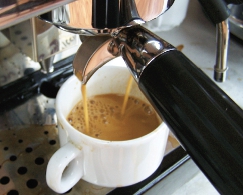
Fracino’s latest innovation – the compact Piccino (baby in Italian) – is specifically aimed at the home market
Maxwell recalls a recent occurrence when they needed panels very quickly and their supplier was able to deliver it straight away. “They put them on the machine overnight and we had them the next day. I couldn’t have done that if it was made in Italy,” he argues.
When it comes to the actual design, ideas for new products usually derive from a distributor, a sales representative or a customer either suggesting ideas for a new machine that isn’t in Fracino’s range or having spotted a gap in the market.
Traditionally Maxwell, who held the position of technical director for over 20 years, would respond by doing a few sketches, discuss these with the sales team, a prototype would then be knocked up and if it worked, it would go into production. “It’s a little more long winded now – in the early days we turned a machine around very fast but that is probably because it would have been a fabricated product with bought in parts. So, we just beat the box up, stuck the parts in, it worked, done.
A project now seems to take between 9 and 12 months from concept to production but the difference is that everything now tends to be tooled up. So we’ll buy injection mould tools, stamp tools, press tools – whatever we need so that the product comes out absolutely perfectly,” says Maxwell.
However, despite now being managing director he is still very much involved in the engineering side of the business and claims to never be happier than when he is surrounded by valves, thermostats and spanners. “I am still very hands on. Engineering is what I love doing – I was born fiddling,” smiles Maxwell.
As the company grew and having realised that there is more to a coffee machine than merely being a square box but instead a product that requires some style and finesse, Fracino have worked with a number of design consultancies in the past, and incidentally on both occasions received awards for the products.
For the design of the Roastilino, a counter top coffee roaster, Maxwell and his engineering team worked with London-based Opius Design. The product went on to win a Design Council Millennium Product award in 2000. The second award-winning product, which was created with the help of London-based consultancy Design Stream, was the Cybercino, the company’s first bean to cup coffee machine. Launched in 2009 it was awarded the Caterer and Hotelkeeper Equipment & Supplies Excellence Award 2009 for technical innovation and expertise.
Box clever
The spark for the Cybercino in fact came from Maxwell who had seen a gap in the market for a bean to cup coffee machine. “We hadn’t had one in the range and we weren’t prepared to buy one in from another manufacturer – we were not going down that road again. So, we made it ourselves,” says Maxwell.
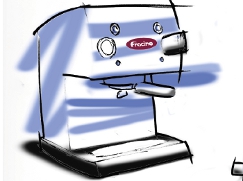
Peter Nielsen’s sketches…cardboard models…and the prototype
However, developing a fully automated machine that can produce espresso and cappuccino drinks at the touch of a button was not as easy as it sounded and it was five years before the Cybercino reached the market. “It’s the hardest thing we have ever done and we have done some hard projects,” says Maxwell. “The reason is because you are reinventing the wheel. Unlike other bean to cup machines which all brew vertically, we wanted to maintain the quality of the coffee and so we tried to make the Cybercino as close to a traditional machine as possible. So you put the coffee in, it compresses it, makes the coffee, brews down – everything is the same but we tried to do that but automate it and it was very, very difficult.”
But they did manage it and despite having to iron out a number of niggly faults and re-engineer certain parts, this retro-style machine with its innovative technology has become a great addition to the range. “At around £7,000 it is an expensive machine so you aren’t going to sell them every day of the week but it’s doing well and we have quite a few people interested in at the moment,” says Maxwell.
Design in-house
Having previously outsourced design Fracino now has its very own in-house design engineer. Peter Nielsen, an MA product design graduate from Birmingham City University, came to Fracino in July 2009 on a three month work placement scheme. His task during this time was to work on the design of a new compact coffee machine for the domestic market called Piccino. Although he was unable to complete the project in the tight time frame, impressed by what he had achieved, Maxwell decided to offer him a full time position at the company and so complete the project.
At just 250mm wide x 310mm deep x 355 mm high the Piccino has two copper boilers and can both steam milk and make coffee at the same time. “We have designed the steamer to froth milk almost continuously so there is no pressure loss as with other home coffee machines which use aluminium flash boilers. Piccino features an external pressure gauge for the user to monitor steam pressure within the machine,” explains Maxwell.
As Nielsen explains, having received the brief from Maxwell the first stage was to build a test rig to see whether, in principle, the concept would work. Once that was proved he then produced a great deal of sketches and from those he created card models.
Maxwell laughs at how the design office was filled with dozens and dozens of card models. But it helped to refine their ideas and once they had selected a model Nielsen moved into CAD, a design tool that is completely foreign to Maxwell. “I’ve never done 3D,” he admits. “Design Stream always used SolidWorks but I have never touched it.” Nielsen explains that he modelled the components and the chassis in Rhino, constantly tweaking the design and producing many renderings.
From there he transferred the 2D drawings from Rhino over to AutoCAD where he started to model the part components. “As well as redesigning the standard forging and boiler top I also asked him to redesign the filter holder that you put the coffee in with the view that if we invest in the tool on that then we can use that part in our standard machines as well because it’s the same size. So it allows us to revamp our other machines which is quite nice,” says Maxwell. In fact, Maxwell admits that Nielsen had to virtually redesign everything that went into the Piccino.
Overcoming bottlenecks
From there they used Materialise, a rapid prototyping bureau in Sheffield, to create the prototypes for them to test the design. However, if they needed ordinary hand turned CNC parts or a rough chassis knocking up then the technicians in the workshop were able to do that on-site.
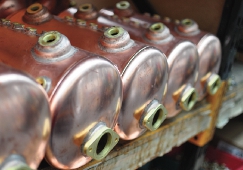
All Fracino’s machines feature large capacity boilers, which are hand built from stainless steel, copper and brass in the factory…inside Fracino’s factory in the Wryley Trading Estate just off the M6 motorway in Birmingham
A working prototype of the Piccino was shown at two trade shows earlier this year – Hotelympia and Caffe Culture. Priced at £435 plus VAT Piccino received a lot of interest but actually getting it manufactured has proved rather challenging with a number of bottlenecks that have caused delays. “We lost three months just trying to get someone to make the prototype chassis. “It’s been a major challenge,” says Maxwell. “So, now we have purchased a laser cutting machine and we will be doing it in-house.
It was simple brackets that took nine weeks to produce. So, from now on if we need a part we can turn it round in two days.” Although a new laser cutting machine is a big investment Maxwell believes that it will pay off in the long run and will also enable them to be more in control of the process. The good news is that Piccino is on the point of production and will be available in November.
On the move
Fracino will also soon be expanding as a new 24,000 sq. ft. factory has been purchased across the road from the current one. The plan is to install a new assembly line and move from batch to line production hopefully speeding up the process. Additionally, the sheet metal work, which is currently subcontracted out to three different factories, will now also be done in-house.
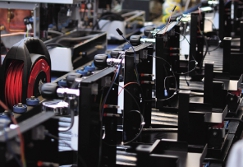
Currently Fracino use batch production however, it will soon be moving to line production in order to speed up the process…The Cybercino in use in the factory
“The last four months have been the ultimate test for us as we just couldn’t get the metal panels in fast enough. Our production has gone up about 20% and we just can’t get enough metal work in to satisfy our need,” explains Maxwell. “Coffee machines are quite heavy – the majority of the cost of a machine is in the chassis – that and the boilers. So, if we get that sorted then we really have total control.”
So, Fracino has weathered the recession and is certainly not resting on its laurels but continues to innovate and seek out new markets. But the burning question is, does Maxwell still like coffee? “Oh Yes. I absolutely love coffee and we serve the best coffee around. The fantastic smell of coffee in our reception where we take it in turns making lattes and cappuccinos for the team gives us our caffeine fix and powers us through the day!”
Runs in the family
Fracino is home to three generations of Maxwells – Frank Maxwell, the original founder and now company chairman, his son Adrian Maxwell, who was technical director and took over the role of managing director three years ago, Adrian’s wife Marion who is the credit controller and their daughter Rebecca who joined the business in June 2009.
Frank Maxwell, a design engineer, launched his business in 1964 having been inspired to go into the coffee machine business after bringing one back with him from a holiday in Italy. He initially worked out of his van and started importing and supplying coffee machines to retail outlets in Britain.
From the age of just two Adrian Maxwell accompanied his dad in his van on his trips repairing and servicing coffee machines. “Having worked with them for most of my life I know coffee machines back to front and inside out and upside down,” he smiles. “There isn’t much about I don’t know about coffee machines.”
From the age of 10 he worked in the workshop during his school holidays. “I would strip down the machines, clean, paint and then rebuild them. I got to a stage where I could even rewire them and put the electronics in. I did it for pocket money and I liked doing it – simple as that,” says Maxwell.
When he was 16 Maxwell and his father decided that it wouldn’t be beneficial for him to do his apprenticeship in the family business. “So I ended up doing my apprenticeship at Rolls Royce’s Coventry plant doing production engineering on gas turbines,” he says. “The basic training was absolutely superb; I did a bit of everything – machining, milling, grinding, electrical, drawing office. I really enjoyed it and learnt a great deal.”
After his practical apprenticeship he worked in the factory for 12 months but the demand for the company’s products was falling and Maxwell soon realised that there weren’t any job prospects there for him and so left to seek out new opportunities. He returned to help his dad during a particularly busy spell and hasn’t looked back. “I joined dad in 1986 when I was 22 and I have been there ever since.”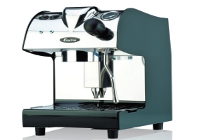
Bringing everything in-house smooths the grind of coffee machine manufacture






